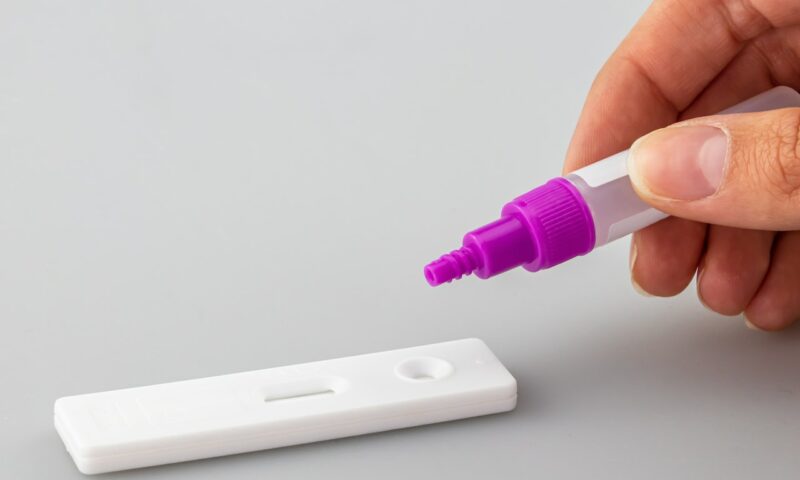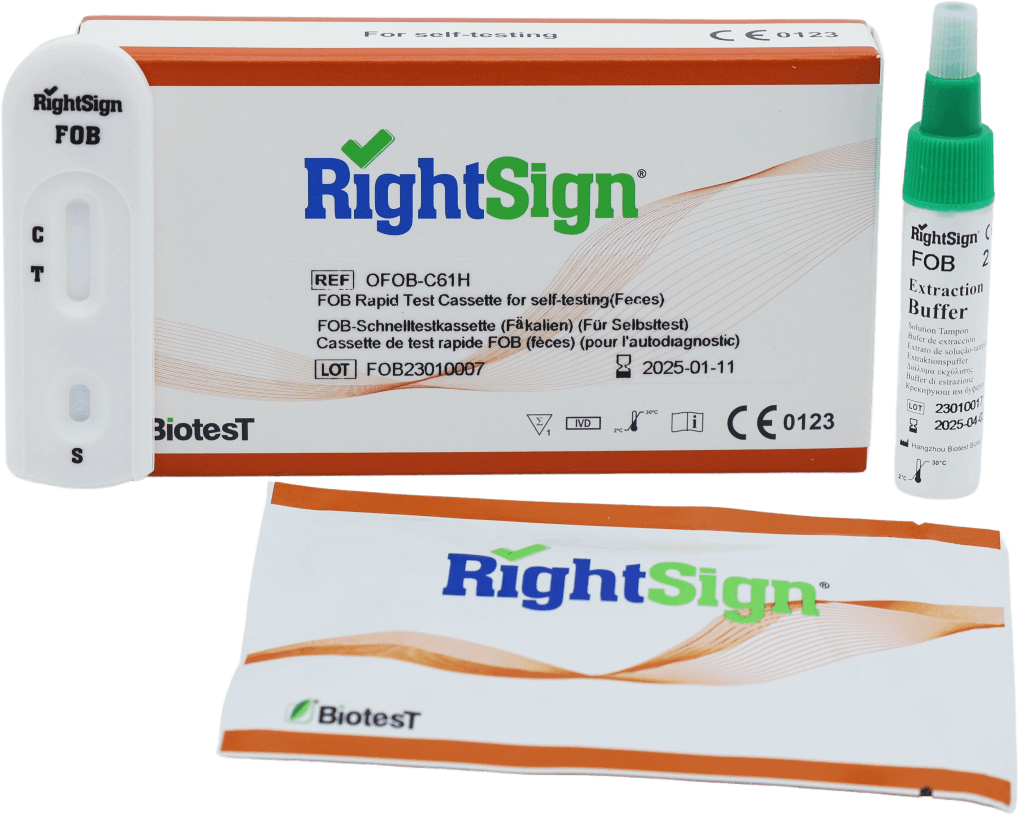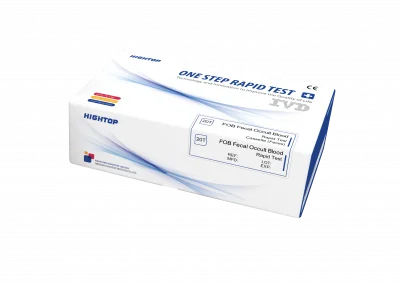Buy FOB Tests
Our FOB tests at OdemShop enable easy and effective early detection of blood in the stool, a possible indication of gastrointestinal diseases. They are easy to handle and provide quick results.
FOB Test Kits: Fecal Occult Blood Test
The Fecal Occult Blood Test (FOBT), a critical component in the early detection of colorectal cancer, serves as a non-invasive diagnostic tool to identify hidden blood in stool samples that may not be visible to the naked eye.
Understanding the concept of fecal occult blood
This test is predicated on the premise that gastrointestinal lesions, including precancerous polyps and cancers, can bleed intermittently and secrete minuscule amounts of blood into the feces, which can be an early indication of an underlying pathology.
How is the fecal occult blood test conducted?
To detect the presence of hidden blood in stool, a fecal occult blood test (FOBT) is performed, employing a simple, non-invasive methodology.
Using a test kit, a stool sample is collected and analyzed for traces of blood.
A positive FOBT result may indicate gastrointestinal issues, prompting further diagnostic evaluation.
Benefits of fecal occult blood test
Understanding the fecal occult blood test's methodology lays the foundation for appreciating its numerous advantages in non-invasively detecting hidden blood in the stool, which may signify various gastrointestinal conditions.
The fecal occult blood test is a cornerstone in cancer screening, particularly for colorectal cancer. A positive FOBT prompts further diagnostic evaluation, while a negative test result provides reassurance, making it an essential tool to screen for colorectal cancer effectively.

Common misconceptions about fecal occult blood test
Despite its proven efficacy in early detection of colorectal cancer, several myths and misunderstandings about fecal occult blood tests persist, potentially deterring individuals from utilizing this critical screening tool.
A negative test doesn't always mean you have cancer; small amounts of blood can be from benign conditions.
Conversely, not all blood in your stool means cancer. Certain foods and medications can affect the results, leading to false positives or negatives.
Benefits of national bowel cancer screening programs
National bowel cancer screening programs, which often incorporate fecal occult blood tests, play a crucial role in reducing mortality rates by enabling the early detection and treatment of colorectal cancer.
Implementing a national bowel cancer screening program, with recommended FOBT every two years, significantly diminishes the risk of developing colorectal cancer through early intervention.
Population-based colorectal cancer screening is essential for improving long-term public health outcomes.
Why is Fecal Occult Blood Test Important for Cancer Screening?
The Fecal Occult Blood Test (FOBT) stands as an indispensable instrument for the early detection of colorectal cancer, pivotal in enhancing patient survival rates and treatment outcomes.
Implementing regular screening with the FOBT facilitates the discovery of hidden blood in feces, a potential sign of cancer within the colon or rectum—often before the onset of symptoms.
Notably, the FOBT offers a non-invasive and cost-effective solution for early intervention.
The role of fecal occult blood test in detecting colorectal cancer
These screening tests, including the fecal immunochemical test and immunochemical fecal occult blood test, are essential in identifying early signs of colorectal cancer. They play a crucial role in reducing the risk of developing advanced disease.
Understanding the significance of early detection
Detecting colorectal cancer at its inception stages through the use of fecal occult blood tests can markedly improve patient prognosis by enabling more effective and less invasive treatment options.
Early detection through colorectal cancer screening, specifically noting occult blood in the stool, significantly reduces the risk for colorectal cancer progression.
Fecal occult blood test results offer crucial insights; a negative test result means no detectable blood, suggesting a lower risk profile.

How often should a patient get an FOB test for cancer screening?
Regular screening intervals for fecal occult blood tests (FOBT) play a pivotal role in the timely detection of colorectal cancer. Generally recommended annually for individuals from an age of 50 years , adherence to this schedule enhances the efficacy of colorectal cancer screening. This allows for earlier intervention, which is crucial in improving outcomes. The convenience of performing an FOBT at home underscores the feasibility of maintaining regular colorectal cancer screenings. This approach effectively screens for bowel cancer, ensuring that potential cases are identified and treated promptly.
Comparison with other colorectal cancer screening tests
Within the spectrum of colorectal cancer screening methods, the Fecal Occult Blood Test (FOBT) is distinguished by its non-invasive nature and its critical role in identifying hidden blood in stool, which may be an early sign of cancer.
- Guaiac Test: Older, requires dietary restrictions, less sensitive.
- Immunochemical Testing: More specific, no dietary restrictions, better at detecting human hemoglobin.
- Stool DNA Test: Analyzes DNA markers, higher sensitivity, less frequent.
- Colorectal Cancer Screening Programme: Integrates various tests, including FOBT, for population-level screening.
Benefits of regular fecal occult blood testing for cancer prevention
Fecal Occult Blood Testing (FOBT) stands as a cornerstone in colorectal cancer prevention, offering a simple and non-invasive method to potentially identify early signs of cancer before symptoms arise..
The benefits of regular testing with FOBT include early detection of colorectal cancer, which is crucial for effective treatment and increases the chances of successful outcomes.
How to Prepare and Perform Fecal Occult Blood Test?
In the following sections, we will outline the essential steps for conducting the FOBtest at home, highlight common errors to avoid, and provide practical advice to ensure the reliability of results when using an FOB test kit.
Steps to prepare for the test
Prior to conducting a fecal occult blood test, individuals should carefully follow specific dietary and medicinal guidelines to ensure accurate results.
- Avoid foods and medications that may affect the results for how long as advised, typically several days.
- Cease taking vitamin C or supplements 48 hours before the test.
- Refrain from nonsteroidal anti-inflammatory drugs (NSAIDs) for 7 days, unless otherwise instructed.
- Utilize the test kit exactly as directed for the type of test being done.

Performing the fecal occult blood test at home
Having adhered to the necessary dietary and medication guidelines, individuals are now ready to execute the fecal occult blood test with the provided at-home kit.
Carefully collect a stool sample using the tools provided, apply it to the test card, and await the test result.
This home screening process is pivotal for detecting hidden blood in the stool, a potential indicator of gastrointestinal issues.
Common mistakes to avoid during the test
To ensure accurate results from a fecal occult blood test, it is crucial to avoid common errors during the collection and preparation process.
- Not following dietary restrictions before completing the FOBT, as certain foods can mimic occult blood.
- Improper stool sample collection, risking contamination or degradation.
- Misinterpreting what blood in your stool may indicate without professional consultation.
- Overlooking instructions on how to interpret what test results mean if FOBT is positive.
Tips for obtaining an accurate test result
Obtaining an accurate result from a fecal occult blood test (FOBT) necessitates careful adherence to both dietary guidelines and precise sample collection methods. To detect colon cancer, the FOBT is also essential. Avoiding certain foods and medications ensures the faecal occult blood analysis is unaffected by false positives or negatives.
Precise stool occult blood tests require following instructions meticulously to obtain accurate results.
Key considerations for using a FOB test kit
Building on the foundation of careful preparation, the proper use of a fecal occult blood test kit is crucial for ensuring the reliability and accuracy of the results.
- Follow pre-test dietary and medication restrictions to avoid false positives or negatives.
- Collect stool samples as directed to ensure adequate sampling for the detection of colorectal cancer.
- Store and handle samples appropriately to maintain specimen integrity.
- Interpret results diligently, understanding that blood in the stool may necessitate further colorectal cancer screening.
Understanding Fecal Occult Blood Test Results and Interpretation
A positive result may indicate the presence of hidden blood in the stool, a potential marker of conditions such as colorectal cancer or polyps, while a negative result generally suggests the absence of bleeding at the time of testing.
However, various factors, including certain foods, medications, and medical conditions, can influence the accuracy of FOB tests, necessitating a careful analysis of results in the context of the patient's overall clinical picture.
Interpreting positive FOB test results
A positive result from a Fecal Occult Blood (FOB) test indicates the presence of blood in the stool, which may suggest gastrointestinal bleeding and necessitates further medical evaluation.
- Confirmatory Testing: Additional tests, such as colonoscopy, are required to determine the source of bleeding.
- Differential Diagnosis: Conditions such as colorectal cancer, polyps, or hemorrhoids could be responsible.
- Risk Assessment: Evaluates the probability of significant gastrointestinal disorders.
- Monitoring and Follow-Up: Ensures appropriate treatment and surveillance for patients with positive FOB test results.

Interpreting negative FOB test results
While a negative FOB test result generally indicates the absence of blood in the stool, it does not conclusively rule out gastrointestinal disorders or colorectal cancer. However, since the occult blood test is one tool among many, further evaluation may be necessary if symptoms persist, as FOBT finds blood intermittently, not continuously.
Factors that may affect the results of the test
Several factors can influence the accuracy of fecal occult blood test (FOBT) results, potentially leading to false positives or negatives that may affect the interpretation and subsequent clinical decisions.
- Dietary Habits: Certain foods and supplements can cause misleading outcomes.
- Medication Use: Some medicines may alter the detection of blood.
- Sample Handling: Improper collection or storage can degrade the sample.
- Test Sensitivity: Variations in test kits can affect the amount of blood detected.
Where to buy FOB Tests in Bulk / Wholesale
Acquiring FOB test kits in bulk is a streamlined process when partnering with reputable medical supply distributors or utilizing specialized online wholesale platforms like OdemShop.
Ensuring a well-stocked inventory through wholesale purchase is the cornerstone of facilitating early cancer detection.
Related categories:
You might also be interested in

How Long is a Rapid Test Valid?
The validity period of rapid tests is of great importance in understanding their effectiveness in detecting infections. In this article, we will take an...
View Post

